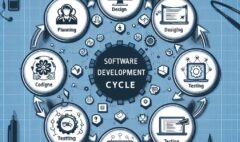Role of a Full-Stack Developer
Role of a Full-Stack Developer
Role of a Full-Stack Developer
In the dynamic realm of web development, the term “full-stack developer” has become synonymous with versatility and proficiency. A full-stack developer is a professional who possesses the skills and expertise to handle both the front-end and back-end aspects of web applications. This article aims to demystify the role of a full-stack developer, exploring the skills required, the responsibilities they shoulder, and the significance of their role in the ever-evolving landscape of technology.
What is a Full-Stack Developer?
A full-stack developer is an individual with the ability to work on both the client-side (front-end) and server-side (back-end) of web applications. This comprehensive skill set allows them to navigate through the entire development stack, from designing user interfaces to managing databases and server infrastructure. In essence, full-stack developers possess a holistic understanding of the complete web development process.
Core Skills of a Full-Stack Developer:
1. Front-End Technologies:
- HTML/CSS: Proficiency in structuring web content and styling elements.
- JavaScript: Mastery in creating dynamic and interactive user interfaces.
2. Frameworks and Libraries:
- React, Angular, or Vue.js: Expertise in modern front-end frameworks for building single-page applications.
- Bootstrap or Materialize: Knowledge of popular CSS frameworks for responsive design.
3. Back-End Technologies:
- Server-Side Languages: Mastery in languages like Node.js, Python (Django/Flask), Ruby (Ruby on Rails), or Java.
- Database Management: Experience in working with databases such as MySQL, PostgreSQL, MongoDB, or Firebase.
4. Server and Hosting:
- Server Management: Understanding server architecture and deployment.
- Cloud Platforms: Familiarity with cloud services like AWS, Azure, or Google Cloud.
5. Version Control/Git:
- Git: Proficiency in using version control systems for collaborative development.
6. DevOps and CI/CD:
- DevOps Tools: Knowledge of tools like Docker, Kubernetes for containerization, and orchestration.
- Continuous Integration/Continuous Deployment (CI/CD): Implementing automated pipelines for efficient development workflows.
7. Database Architecture:
- Relational and NoSQL Databases: Understanding the differences and choosing the right database for specific requirements.
8. APIs (Application Programming Interfaces):
- RESTful APIs: Building and consuming APIs to enable communication between the front-end and back-end.
- GraphQL: Understanding the query language for APIs.
9. Problem-Solving and Algorithmic Thinking:
- Algorithmic Skills: Ability to solve complex problems and optimize code for efficiency.
Responsibilities of a Full-Stack Developer:
1. Project Planning and Architecture:
- Participate in project planning, outlining the architecture, and choosing the technology stack.
2. Front-End Development:
- Design and develop user interfaces, ensuring a seamless and engaging user experience.
3. Back-End Development:
- Build and maintain server-side logic, databases, and APIs for efficient data processing.
4. Database Management:
- Design, implement, and manage databases, ensuring data integrity and optimal performance.
5. Integration of Third-Party Services:
- Integrate external services and APIs to enhance application functionality.
6. Testing:
- Conduct thorough testing, including unit testing, integration testing, and end-to-end testing.
7. Deployment and Maintenance:
- Deploy applications to production environments and handle ongoing maintenance.
8. Collaboration and Communication:
- Collaborate with cross-functional teams, communicate effectively, and contribute to a positive development culture.
Significance of Full-Stack Developers:
- Efficiency and Cost-Effectiveness: Full-stack developers can work on all aspects of a project, reducing the need for multiple specialized roles and streamlining development timelines.
- Holistic Problem Solving: With a broad skill set, full-stack developers can address challenges across the entire development process, from user interface issues to database optimization.
- Adaptability to Technology Changes: Full-stack developers are well-equipped to adapt to evolving technologies, making them valuable assets in the fast-paced tech industry.
- Facilitation of Communication: Their ability to work on both ends of the spectrum fosters better communication between front-end and back-end teams, leading to more cohesive development.
- Start-up Friendliness: In start-up environments with limited resources, having developers who can contribute to different aspects of a project is highly advantageous.
Computer Engineers at Computerkida.in:
Computer Engineers keen on learning front-end and back-end programming languages can leverage the comprehensive courses available at Computerkida.in. Our platform offers a diverse range of tutorials and hands-on projects designed to enhance your skills in languages such as Java, PHP, JavaScript, Android, Kotlin, Python, and more. Whether you’re a student, a professional, or an enthusiast, Computerkida.in provides a structured and accessible learning environment to help you master the intricacies of full-stack development. Embark on your learning journey with us and unlock the potential to become a proficient full-stack developer. Happy coding!

